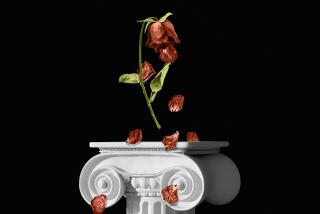‘Big Brother’ Looking for Voyeurs
- Share via
AMSTERDAM — Bart is big. Madonna, Donald Trump and Howard Stern all rolled into one. Only bigger. He is the living, breathing and (yes) slightly reluctant testament to the power of “Big Brother,” the reality TV series born here that will be recast for U.S. consumption and land on CBS this summer.
A day does not go by when Bart is not mentioned in the news in the Netherlands or when autograph hounds and paparazzi do not swarm him. The fame thing, he admits, is nice, but enough already: “I’m not planning on becoming any more famous than I already am. I’d rather have it go away.”
A former soldier with the Dutch peacekeeping force in Bosnia, Bart Springin’t’veld, 23, does, however, appreciate the irony of it all. “I don’t think I’ve done anything special,” he says, laughing. “To me it’s just ridiculous.”
Well, yes. Bart is famous for doing nothing, but doing it on an extremely popular TV show. For 100 days and nights last fall, he and nine other people--or “contestants”--stayed in a house equipped with 83 TV cameras.
They ate. Drank. Talked. Played games. Sang songs. And slept. Bart also had sex with another contestant, Sabine. Viewers saw only blankets moving suggestively and the two lovers then sharing a post-coital smoke. But it was the most notorious consummation in Dutch history, and it got “ER”-size ratings.
At the end of the 100 days, Bart was the only one left, and for his trouble he got 250,000 guilders, or about $100,000. Bart wasn’t the only star of the Dutch TV sensation “Big Brother,” in which every 14 days household members and the viewing audience “nominated” one of the contestants for eviction.
Sabine got the boot toward the end of the run and subsequently landed a pictorial contract with the Dutch edition of Playboy. So did Tara, who left early out of boredom. Less, er, photogenic female contestants Karin and Bianca weren’t offered spreads, while Martin, Willem and Maurice returned to relatively normal lives after the show ended Dec. 30.
Ruud--who most of Holland assumed would win--is an occasional contestant on game shows, attends mall openings, signs autographs and makes media appearances, for which he charges a fee.
Meanwhile, in Hilversum, about 25 kilometers southeast of Amsterdam, John de Mol--like Bart--is laughing. A 44-year-old TV executive with piercing eyes and a rapid-fire patter, De Mol, who will produce and oversee the production of the U.S. version for CBS, is proprietor of Holland’s largest TV production company, which created “Brother” and is based in this small city.
‘You Have to Take Care of Those People’
In January, after selling the rights to “Big Brother” to CBS for around $17 million, De Mol says, “for one and a half hours, I was the most happy man in the world, then the most worried man in the world. It comes down to the fact that we have to make it work. I’m confident that it will work. . . . Those people in the house will be really embraced by the whole nation. They’ll come out huge celebrities for the next five years.”
De Mol has heard all the criticism, mostly that “Big Brother”--named for the omnipresent overseer in George Orwell’s futuristic novel “1984”--was fascist, psychologically abusive, depraved and threatened to subvert Dutch family values.
“I agree, it is dangerous,” he says. “You have to take care of those people. You have to make sure your psychological team is in place.” But, he adds, much of the early criticism has evaporated.
“Big Brother’s” success “is based on voyeurism,” De Mol admits. “But I say another word for voyeurism is curiosity. If you walk down the street with your dog and all the windows are closed in the houses you pass, and suddenly there’s one house where the windows are open, I’ll bet you watch inside. It’s the same reaction with ‘Big Brother.’ You get intrigued by the life of normal people in abnormal circumstances.”
It would be easy to dismiss this as hype, except that “Brother” regularly drew as much as half of the TV audience on some nights. And now, two months after it rushed through Holland like a cultural tsunami, the Dutch are asking: What happened?
Though much of the early criticism has dissipated, newspaper editorials continue to wonder what its huge success says about the Dutch character. Martin Huygen, a columnist with the daily NRC Handelsblad, calls “Big Brother” “anti-television. It’s like Dutch politics--very boring. Nothing ever happened.” But, he adds, “it had to do with Dutch identity. It was an extension of the Dutch living room.”
Henri Beunders, a professor of media and culture at Erasmus University in Rotterdam, in a recently published book on the “Big Brother” phenomenon titled “It’s Yourself, You See,” explains that the house was a microcosm of the Dutch family and that viewers were projecting themselves onto the contestants. On the book’s cover, appropriately, is a mirror. Beunders says viewers who voted via phone and the Internet tended to punish those who upset the “family” balance. To the shock of many, particularly older Dutch, the randy and rebellious “son” Bart beat the affectionate “uncle” Ruud in the final tally.
Beyond this, though, the Dutch were simply hypnotized by the outsize and often ridiculous spectacle of it all. Barricades were set up around the house--which looked more like a long trailer--and hundreds of spectators were seen cheering their heroes inside. As the show got underway, at least two people tried to parachute into the yard surrounding the house (police removed them). A well-known local pop singer composed a song and sang it to the contestants from outside the barriers. It too became a hit. Spectators often threw objects into the yard, including a tennis ball filled with pot.
Embarrassed Over ‘Brother’ Obsession
Inside, the contestants were oblivious, or so they claimed. The cameras--planted in every room, including the bathroom--showed them talking (often plotting against other contestants) or eating. They were also seen composing a song--in homage to themselves (and yes, it got a lot of radio airplay). Though nudity was virtually nonexistent, Ruud was seen parading around in the altogether.
Even though mostly chaste, in a country with a deep Calvinist streak where pragmatism is considered one of the highest virtues, the Dutch remain bemused and slightly embarrassed over their “Brother” obsession. On a gray February day at the Vossius Gymnasium--a high school--in Amsterdam, Sophie Verschoor and her friends Floor, Heleen, Joelle, Thomas and Aisha admit that they too were stumped by its appeal. Yes, they agree, it was often unbearably dull, and yes, the contestants were often annoying. But Verschoor, a bright 17-year-old who hopes to become a journalist, gets to the nub of it: “People,” she explained, “could look into other people’s rooms without being ashamed.”
More to Read
The complete guide to home viewing
Get Screen Gab for everything about the TV shows and streaming movies everyone’s talking about.
You may occasionally receive promotional content from the Los Angeles Times.






